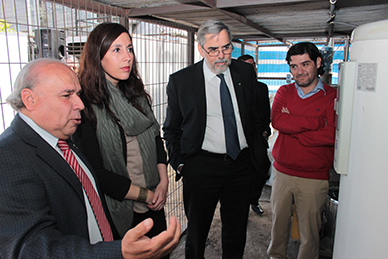- The equipment was acquired with funds awarded to the Department of Chemical Engineering of Universidad de Santiago, in the context of the project “ Teacher Education and Training in Solar Thermal Energy” sponsored by the Ministry of Energy, the Global Environment Facility (GEF) and the United Nations Development Program (UNDP), plus the active collaboration of ProCobre.
- “It is a special occasion for the University, because we are receiving cutting-edge technology related to a sensitive issue for our society: energy saving,” Francisco Cubillos, the Director of the Department of Chemical Engineering said, adding that the implementation of this lab will contribute to both teaching and research.”
Our University has new equipment available to study and develop renewable energies, as the Solar Thermal Laboratory was inaugurated at the Department of Chemical Engineering, on October 16th. This laboratory has cutting-technology that will strengthen teaching activities and research on this field.
The opening ceremony was attended by Juan Manuel Zolezzi, President of Universidad de Santiago; Francisco Cubillos, Director of the Department of Chemical Engineering; Paloma Toranzos, representative of the United Nations Development Program; Andrés Véliz, coordinator of the Renewable Energy Program of the Ministry of Energy, and, on behalf of the Dean of the Faculty of Engineering, Cristián Vargas, Vice-Dean for Research and Development.
The laboratory was set up at the campus, in an open place with enough exposure to sunlight and it includes two solar thermal panels that receive the solar radiation. Then, by means of a copper heat collection system, the water is heated and stored in a tank nearby, which heating capacity is complemented by the use of water heaters according to what is needed.
“It is a special occasion for Universidad de Santiago, because we are receiving equipment with cutting-edge technology related to a very sensitive issue for our society: energy saving. The system can operate in eight different ways, what provides a solar thermal lab that will allow us to have teaching activities and conduct studies in this field. This advance will position us as a leading academic unit in the implementation of this technology,” director Cubillos said.”
Part of a larger project
The new equipment is part of the “Teacher Education and Training in Solar Thermal Energy” project awarded to the Department of Chemical Engineering and sponsored by the Solar Program of the Ministry of Energy; the Global Environment Facility (GEF) and the United Nations Development Program (UNDP), plus the active collaboration of ProCobre.
The initiative also includes free workshops to disseminate information on how society can use this type of energy and, in the future, the incorporation of relevant knowledge about solar thermal energy in the curricula of the programs given by the Department. Today, one of the two 50-hour workshops is being held to train professionals, technicians, students and people who work as plumbers and electricians. There were more than 150 applicants for only 21 places available, “what shows a high interest in this field,” Cubillos added.
Paloma Toranzos, representative of the UNDP, said that one of the commands that the UN gives to the programs is precisely to give support to the country so that it reaches sustainable development with regards to initiatives like renewable energies. “In the context of the project, installing this new system has been a major success; let’s hope it has a significant impact on the university community,” she added.
Andrés Véliz, coordinator of the Renewable Energy Program of the Ministry of Energy, said that the project was awarded funds because it exceeded the initial expectations. “We first thought about a training course, but we were pleasantly surprised that the knowledge gathered on this issue will be included in the programs’ curricula, and even more, there is research on this field,” he said.
ProCobre’s consultant Sergio Molleda explained that this type of technology also impacts the country image and the economy of mining industry, as “the parts of these solar collectors, like plates, piping and heat collection systems are made of copper,” what expands the uses of this mineral and its world exporting potential. “We think that developing these projects at Universidad de Santiago is essential, because they promote the use of this type of energies in the future in different productive sectors,” he said.
Translated by Marcela Contreras
[[{"type":"media","view_mode":"media_original","fid":"4249","attributes":{"alt":"","class":"media-image","typeof":"foaf:Image"}}]]



